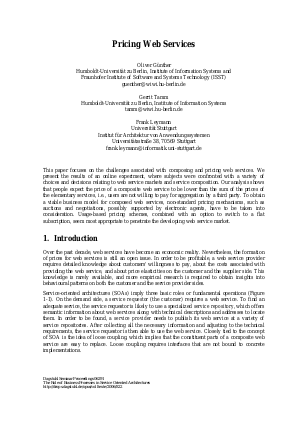Pricing Web Services
Authors Oliver Günther, Gerrit Tamm, Frank Leymann
-
Part of:
Volume:
Dagstuhl Seminar Proceedings, Volume 6291
Part of: Series: Dagstuhl Seminar Proceedings (DagSemProc) - License:
 Creative Commons Attribution 4.0 International license
Creative Commons Attribution 4.0 International license
- Publication Date: 2006-11-24
File

PDF
DagSemProc.06291.12.pdf
- Filesize: 121 kB
- 13 pages
Document Identifiers
Subject Classification
Keywords
- Composite web services
- pricing
Metrics
- Access Statistics
-
Total Accesses (updated on a weekly basis)
0PDF Downloads0Metadata Views
Abstract
This paper focuses on the challenges associated with composing and pricing web services. We present the results of an online experiment, where subjects were confronted with a variety of choices and decisions relating to web service markets and service composition. Our analysis shows that people expect the price of a composite web service to be lower than the sum of the prices of the elementary services, i.e., users are not willing to pay for aggregation by a third party. To obtain a viable business model for composed web services, non-standard pricing mechanisms, such as auctions and negotiations, possibly supported by electronic agents, have to be taken into consideration. Usage-based pricing schemes, combined with an option to switch to a flat subscription, seem most appropriate to penetrate the developing web service market.
Cite As Get BibTex
Oliver Günther, Gerrit Tamm, and Frank Leymann. Pricing Web Services. In The Role of Business Processes in Service Oriented Architectures. Dagstuhl Seminar Proceedings, Volume 6291, pp. 1-13, Schloss Dagstuhl – Leibniz-Zentrum für Informatik (2006)
https://doi.org/10.4230/DagSemProc.06291.12
BibTex
@InProceedings{gunther_et_al:DagSemProc.06291.12,
author = {G\"{u}nther, Oliver and Tamm, Gerrit and Leymann, Frank},
title = {{Pricing Web Services}},
booktitle = {The Role of Business Processes in Service Oriented Architectures},
pages = {1--13},
series = {Dagstuhl Seminar Proceedings (DagSemProc)},
ISSN = {1862-4405},
year = {2006},
volume = {6291},
editor = {Frank Leymann and Wolfgang Reisig and Satish R. Thatte and Wil van der Aalst},
publisher = {Schloss Dagstuhl -- Leibniz-Zentrum f{\"u}r Informatik},
address = {Dagstuhl, Germany},
URL = {https://drops.dagstuhl.de/entities/document/10.4230/DagSemProc.06291.12},
URN = {urn:nbn:de:0030-drops-8220},
doi = {10.4230/DagSemProc.06291.12},
annote = {Keywords: Composite web services, pricing}
}
